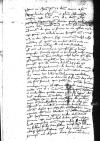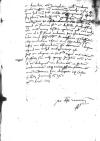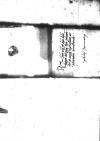Letter #6099
Mauritius FERBER to Ioannes DANTISCUSHeilsberg (Lidzbark), 1536-01-13
| received [1536]-01-14 Manuscript sources:
Auxiliary sources:
| ||||||
Text & apparatus & commentary Plain text Text & commentary Text & apparatus
 AAWO, AB, D. 8, f. 1v unnambered after f. 57
AAWO, AB, D. 8, f. 1v unnambered after f. 57
Reverendissimo in Christo Patri et Domino, domino
Reverendissime in Christo Pater et Domine, amice et frater singulariter carissime et plurimum observande.
Accepimus nuper cf.
De Danico bello iacta est semel alea Martis, quando autem receptui canetur, Deus novit. Hoc bellum Orientales atque Occidentales cum magno aerumna et detrimento sustinent. Deus aliquando illi finem faciat, qui potens est, quando humana malignitas id conficere non vult aut requirat(?).
Mitto Reverendissimae Dominationi Vestrae citationem eo modo, quo ipsam desiderat, et eandem obsecro, quando vacare potest, velit legere illam legem: “Quisquis cum militibus” C.[1] ad legem Iuliam.[2] Intelligit ex ea, quid meus subditus ille publicus latro cum suis adherentibus meretur. Sic de aliis, qui conspirant et invadant principes et dominos suos, non tamen desunt, qui, postposita omni iustitia et aequitate, illms. um reg. illud⌈umms. um reg. illud⌉ tueri contendunt, non attendentes, etiam quod hoc facinus egerit nulla diffidatione praemio. Ego autem nihil dubito, quin iustitia locum occupavit coram iusto iudice ... illegible⌈...... illegible⌉. Nusquam in falsis fratribus tuta fides. Invisi sumus illis odioque habent ecclesiasticos etc.
Deus nostrum senem principem ad aliquot annos servet ad<h>uc superinscribed⌈ad<h>ucad<h>uc superinscribed⌉(?) incolumem,
 AAWO, AB, D. 8, f. 57v eo decedente nam im<m>inebit nobis <non> mediocre periculum. Eapropter non inconveniens mihi visum est, quo haberemus tali eventu cum proinquioribus episcopis, scilicet
AAWO, AB, D. 8, f. 57v eo decedente nam im<m>inebit nobis <non> mediocre periculum. Eapropter non inconveniens mihi visum est, quo haberemus tali eventu cum proinquioribus episcopis, scilicet
Item, an aliquis in cancellariatum
Cui diuturnam et perpetuam incolumitatem atque omnia prospera precor cum recommendatione sui dilige<n>ti.
Ex castro
Reverendissimae Dominationis Vestrae totus


